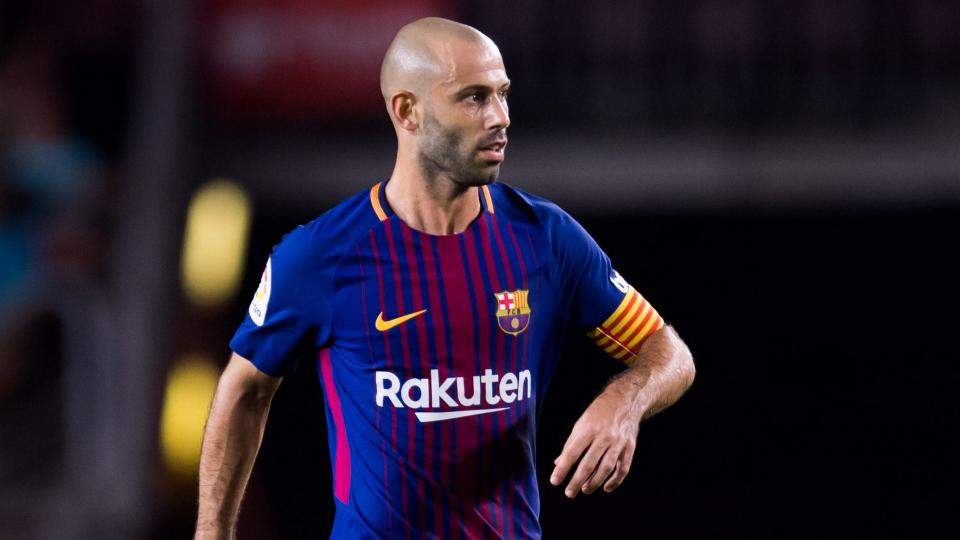Javier Mascherano changed perceptions of centre backs forever

At the peak of Barcelona powers under Pep Guardiola, when they set the zeitgeist for an entire era of European football, the Catalan coach once replied steadfastly to a question of his faith in a player of his. “I would never, ever sell him and I wouldn’t swap him for anyone,” he said. Without context, it could be assumed he was talking about Lionel Messi or Andres Iniesta, maybe even Sergio Busquets. Instead, he was referring to Javier Mascherano.
The Argentine was always overlooked as a star of Guardiola’s Barca side. Of course, the eye was drawn to so many others, with the likes of the aforementioned Messi, Iniesta, Busquets, as well as Xavi Hernandez, Dani Alves and Pedro Rodriguez all capable of putting on a show. Mascherano has never been a showman, though. Even now, with the eulogies flowing over the Argentine’s Barca career as he leaves for China, there is a lack of sparkle.
In fact, Mascherano was considered something of a misfit when he first signed from Liverpool back in 2010. Back then, he was a midfielder. A very good midfielder, at that, but not good enough to break into the Barcelona midfield unit which, at that time, consisted of Busquets, Iniesta and Xavi – arguably the best midfield trio of all time.
READ MORE: Gossip – Real Madrid ‘contact Pochettino’
READ MORE: Ronaldo – I will NEVER leave Real Madrid
READ MORE: Ronaldo admits to relishing Ballon D’Or battles with ‘great’ Messi
Mascherano’s debut did little to convince many that he had a place at Barca, giving away the freekick which led to one of the goals in a 2-0 surprise defeat to Hercules. The Argentine was fortunate not to be shown a red card, with many headlines the next morning exclaiming at how slow and sluggish the new arrival was.
It wasn’t until a series of injuries hit the Barcelona defence that Mascherano was drafted in as a centre back. From that moment on, the Argentine became a key member of the Catalan side. For over five years, maybe even longer, Mascherano was the defensive bedrock of Europe’s most exciting and dynamic football team.
More than that, though, the conversion of Mascherano from a midfielder into a central defender changed the way football looks at the trade of defending. Before the Argentine’s positional shift, centre backs were viewed as bruising, grizzly and tactically simplistic. Their responsibilities were solely defensive in nature. Mascherano set the precedent for all this to change.
Guardiola recognised that by using the Argentine in defence he could create an inherent link between his backline and his midfield. This allowed Guardiola to forge his trademark passing style as a coach, using a player who was comfortable with the ball at his feet in defence, increasing the number of passing triangles available across the pitch.
Purest
Without Mascherano, Guardiola would have had to rethink his entire approach. Iniesta and Xavi were widely viewed as the purest embodiments of Guardiola’s footballing philosophy, but over time Mascherano became a case study of how the Catalan boss moulds players to his specific needs.
Mascherano showed just how good a coach Guardiola is, also showing what a centre back could be in the modern game. Right the way across football, clubs now look for centre backs who are comfortable on the ball, capable of playing out from the back. David Luiz, a player who very nearly made the move to Barca for his passing ability, has built a career off the back of this. Guardiola himself sanctioned a £47.5 million deal for John Stones upon his appointment at Manchester City as he needed a Mascherano-type at his new club.
Some rue this change in the nature of centre backs in football. Gone are figures like John Terry and Nemanja Vidic, Tony Adams and Steve Bruce, defenders who would stick their head in somewhere before their foot. Many pine after the good old days, when centre backs were centre backs and men were men.
But there can be no denying how centre backs, in their modern form, give managers far more tactical and technical freedom. That fundamental reshaping can be traced all the way back to Mascherano’s signed at Barcelona. He arrived as a player many couldn’t envisage fitting in. This week, he left having changed defending forever.

 Yahoo Sport
Yahoo Sport 





































































